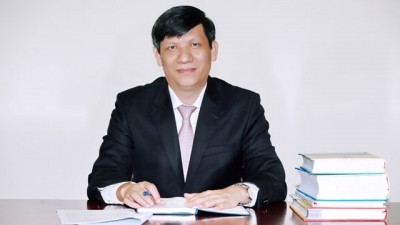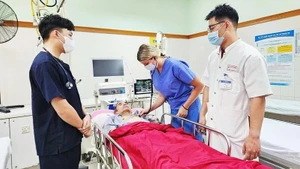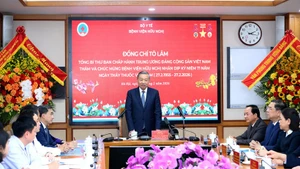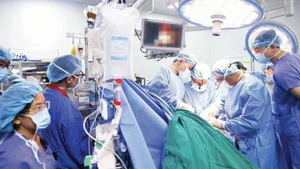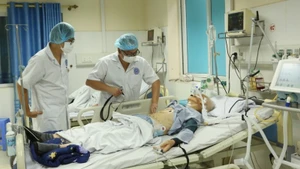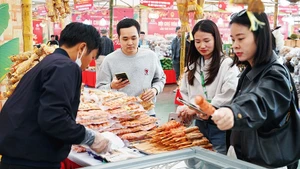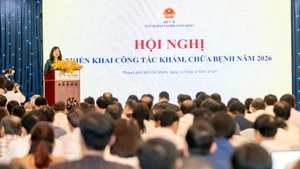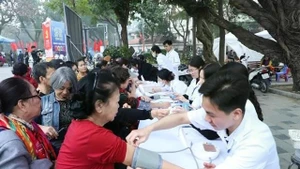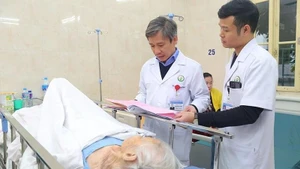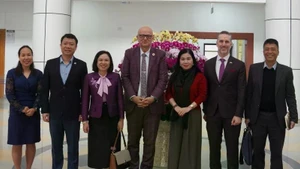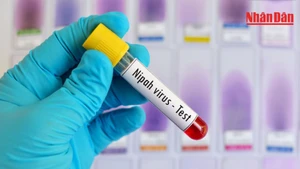Q: The WHO has recently announced an assessment on the National Regulatory Authorities (NRA) survey on Vietnam’s vaccines, saying that the country has passed the NRA main control functions. Could you tell us more about the results of the assessment and actions taken by the Ministry of Health (MoH) to achieve these results?
A: In the WHO review last week, Lahouari Belghabi, a representative of the WHO, who led a group of WHO experts to Vietnam to assess the country's national vaccine management system, said that Vietnam has met NRA critical control function standards with excellent results to guarantee vaccine quality. Vietnam is expected to receive a certificate for its qualified vaccines from the WHO chief representative in the Western Pacific region on June 21.
Vietnam has been registered for NRA standards since 2001. In May 2013, the MoH strengthened organisation of vaccine management agencies and a comprehensive plan was designed to accelerate the NRA’s progress in the assessment. The plan was approved on October 2013, with a series of activities having been carried out. More than 80 officials from four agencies dedicated to the WHO certification − the Drug Administration of Vietnam, the General Department of Preventive Medicine, the Administration of Science and Technology and Training and the National Institute for Control of Vaccine and Biologicals ─ along with representatives from international organisations, have joined the scheme in the past 18 months.
A huge amount of work has been done in a short time, including developing 746 standard operating procedures (SOP) and ten quality manuals, applying them in local units before being submitted to the WHO for evaluation. Hundreds of meetings and more than 40 training courses both at home and abroad on the NRA have been held for nearly 1,500 officers.
In addition, a lot of equipment and modern techniques have been implemented, such as an animal testing centre at the National Institute for Control of Vaccine and Biologicals, equipment for vaccine testing like the Elisa system, and high performance liquid chromatography.
A special mechanism for the management of the NRA standing office was set up, enabling immediate handling of procedures related to the NRA between the MoH leaders with NRA offices, units and involved officers.
Q: With NRA recognition by WHO, what do you think about export potential for Vietnam’s vaccines?
A: A major challenge to the world's vaccine supply is the timely access to quality vaccines when needed. The recent influenza and Ebola epidemics have demonstrated the need to ensure adequate quality vaccine sources for immunisation programmes.
To ensure the quality and safety of vaccines, the WHO has developed evaluation criteria, applied uniformly to all countries around the world, through evaluating the capacity of the national vaccine management administrations.
The evaluation criteria aim to guide countries to tackle weaknesses in their vaccine management systems towards the ultimate goal of producing vaccines meeting international unity standards for safety and quality. Therefore, a prerequisite for ensuring vaccine quality is that the national management system for vaccines in the country to be recognised as meeting the WHO’s NRA standards.
Thus, it can be said that Vietnam’s NRA attainment is very important, indicating that the national management system for vaccines in Vietnam has achieved international vaccine-management standards as set by the WHO. As the quality of vaccines produced in Vietnam has been confirmed, the door is opened for export of made-in-Vietnam vaccines.
Q: What kinds of vaccines do you think have export potential and how is Vietnam’s supply capacity of these vaccines?
Domestically produced vaccines are considered safe and highly effective in disease prevention.
A: Vaccine manufacturers in Vietnam have been producing and supplying tens of millions of doses of vaccines serving local needs. Locally made vaccines are considered safe and highly effective in disease prevention. The self-produced vaccines serving the expanded programme on immunisation have saved the country trillions of dong in importing costs.
Not only that, Vietnamese vaccines have been exported and earned millions of dollars. In recent years, the Company for Vaccine and Biological Production No.1 (VABIOTECH) has exported over 3 million doses of Japanese B encephalitis vaccine to India. Japanese encephalitis vaccines are also penetrating East Timor market. In addition, 32,000 doses of hepatitis A vaccine have been exported to the Republic of Korea and 115,000 doses of oral cholera vaccine to Sri Lanka, the Philippines, and India.
However, the results do not fully reflect the potential and opportunities for the export of domestic vaccine products as the export is still small scale without a high commercial value.
To be able to export to official channels in the international market, especially for international organisations like UNICEF and GAVI to buy in large amounts, Vietnam should ensure higher standards for vaccines and the achievement of NRA approval is a first important step.
In the recent NRA assessment, the WHO said that four of Vietnam’s vaccines ─ Japanese B encephalitis, measles, hepatitis A, and hepatitis B ─ can join WHO pre-appraisal before selling in bulk to international organisations.
Local vaccine manufacturing facilities can currently supply enough doses for both domestic needs and export demand. For example, for Japanese B encephalitis vaccine, the demand for domestic immunisation is approximately 8 million doses, while producing capacity is about 12 million doses a year. For the measles vaccine, local demand is 3 million doses, while Vietnam is capable of producing approximately 7.5 million doses a year. For oral polio vaccine, local manufacturers can produce 40 million doses per year, while only 7.5 million doses are need for domestic demand.
Vietnam currently has four factories producing vaccines, with modern equipment and technology meeting CGMP-WHO standards: VABIOTECH; Pasteur Da Lat Vaccine Company Ltd., (DAVAC); the Centre for Research and Production of Vaccines and Biology (POLYVAC); and the Institute of Vaccines and Medical Biologicals (IVAC). All four factories have qualified staff to produce vaccines with international standards for the national EPI programme and for export.
Q: What kinds of vaccines will Vietnam focus on producing in the future to meet global needs?
A: WHO reports on Vietnam’s NRA assessment also stated that the country has huge potential for vaccine mass production and ranked Vietnam among 25 leading vaccine producers supplying around 90% of the world's vaccines. Vietnamese vaccine experts reached international standards and were invited to join the WHO's delegation to assess Russia's NRA in December.
Recently, the government approved the MoH’s proposal to develop national prophylactic vaccine products for human use. The programme targets that by 2020, Vietnam will have at least seven vaccines meeting the requirements of the national EPI programme, replacing imported vaccines. In particular, multivalent vaccines (the combined 5-in-1 and 6-in-1 vaccines) and vaccines combining various types of antigens are one of the top priorities in the research and development of new vaccines in Vietnam.
| Currently, Vietnam produces 12 types of vaccines preventing tuberculosis, diphtheria, pertussis, tetanus, measles, polio, hepatitis A and B, Japanese B encephalitis, cholera, typhoid, and diarrhea caused by Rota virus, of which ten are used in the national EIP expanded programme. The MoH is accelerating new vaccine development with the goal of meeting 100% of the vaccine needs of locals by 2020 for the combined 6-in-1 vaccine; Hib conjugate vaccine preventing pneumonia and meningitis; pneumococcal vaccination; synthetic typhoid vaccine; inactivated Japanese B encephalitis vaccine made in Vero cells; inactivated polio vaccine; and seasonal influenza and acellular pertussis vaccines. |
